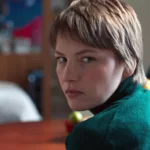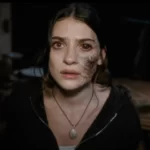With OXV: The Manual, Writer/Director/Producer Darren Paul Fisher has married two of his passions – philosophy and science – into a film that not only works critically, but has commercial potential. TOM Magazine sat down with Darren to discuss weaving your way through complex concepts whilst remembering your audience, why those of us who just have lady luck on their side sparked the idea for the film, and tips to get your independent project to its audience.
TOM: What sparked the idea for OXV: The Manual?
Darren: The actual spark was – it sounds like an anecdote but this is genuinely how it started – I was going out with this girl and they came round with tickets for a raffle for this charity, and obviously if you’re on a date you’re going to buy more tickets to impress. You usually just buy them so you can leave but she wanted to stay for the raffle. I was like, ‘you’re never going to win, and you just buy them for the charity’. She said ‘but I usually win’. I said, ‘you can’t usually win, its mathematics.’ So I was like, ok then. And she won. She said ‘she usually wins something’, and she won something. And then it occurred to me that it must just be normal for her, she had a genuine expectation of that. It got me thinking about people in our lives that are just lucky. I’m quite obsessed with the idea of luck. And that was the spark of that idea, how people can be in the same world but kind of in different universes.
TOM: Were there any other films or projects you drew inspiration from when writing the film?
Darren: Not in terms of content. In terms of approach, yes. The original pitch for the film was Eternal Sunshine of the Spotless Mind meets Primer. Primer is much more obscure, massive in film circles obviously. What I liked about Primer was it had a certain density of dialogue, and it just kind of ran with it. It was obscure in places and deliberately so. Obviously it had success so it showed that there is an audience for that, you can run with it. I didn’t want to make Primer, I just liked that approach and enjoyed it – it was more about exploring the relationship and exploring memory and identity. So those two were kind of the benchmarks. That gave me a sense of how I could explain the genre. The pitch was essentially ‘Eternal Sunshine of the Spotless Mind meets Primer, but neither of them’. When we gave people the script, they came back and went ‘that’s exactly right.’ We didn’t give any synopsis, any outline, we just literally said ‘it’s that meets that, but neither of them.’ (laughs) If you liked either of those films then you’ll like this one.
TOM: There are some quite complex ideas in OXV: The Manual, especially in the second half – was it difficult to write it in a way that got your ideas across but was also easily understandable to the everyday cinemagoer?
Darren: It was always my concern. On the one hand, the film is incredibly self-indulgent because it explores my passion for science and philosophy. You’ve got to have that as a filmmaker because you have to have a passion for what you want to do. So on the one hand it’s self-indulgent, but I literally was very concerned that the audience has a good time. There’s no point in me doing it if no-one’s going to get it. I’m happy with things being ambiguous. A really great filmmaker who used to talk about ambiguous stories – he said ‘ambiguity is fine, because it’s ambiguous.’ I want it to be complex but not confusing. The audience is aware that there is a complexity, they realize that’s deliberate and part of it as opposed to a film that’s just confusing, and isn’t in control of its confusion. It was always a concern with writing, but again it came back to a script is a blueprint for a movie. And when you write an outline or a synopsis for the industry to read, so they can read the outline of the movie quicker because they don’t want to read the script. Sometimes when you write something across two pages, can you imagine this film written in two pages? It would be totally ridiculous. So I refused to write one. I said ‘here’s the pitch, here’s the script. I’m not giving you the outline, you have to read the whole script.’ The film isn’t going to be two pages.
TOM: Can you tell me a bit more about the alternate reality that we’re presented with in OXV: The Manual? It is very similar to our own but there are a few differences.
Darren: Basically the idea is, instead of the guys who discovered DNA, they discovered frequency. And then you run with that – that would affect other scientific discoveries, and that’s why we have that production design where they have old photographs and smart phones. So they’ll have stuff that’s more than what we’ve got, and stuff that’s less than what we’ve got, and stuff that’s the same. There are a few other differences but that’s sort of the basic one. I think it’s very good to start with one simple, divergent thing and then you can build on from that.
TOM: The leads Zac and Marie are portrayed in three stages of life throughout this film – from children, to teenagers and then young adults – was it difficult to cast those roles considering you were looking for people who not only looked like one another, but could act convincingly as well?
Darren: Really hard. Really hard. We were casting for 5 months. It’s hard enough to find really good actors, so to have that as an extra barrier…but for me it was a case of ‘well if we can’t cast it, we can’t make it.’ I would just push back production until we found them. Again being an independent film you can do that – there’s no point going for it before we’ve got people. The tricky one was the teenagers. Child casting is tough, but in terms of making them work together…because what was interesting was Charlie who plays the young Zac had an older brother, who was 15 and also an actor. And they look, you know, perfect. The problem was we knew we wanted Daniel for the lead. So you believe that Charlie would become Rupert (who was his brother), but you wouldn’t believe that Rupert would become Daniel. It was a crying shame that we couldn’t cast the brother. But Dylan (the final choice) had this wonderful energy as well. And then Georgina who plays Marie – again it was finding Lily who plays the young Marie, who is 8, and Chloe who was 10 to play the younger versions. It’s funny because they didn’t actually meet until the wrap party.
TOM: I understand the concepts like philosophy and science were already passions of yours – but did you do other prior research before writing the script?
Darren: I’d always been interested in philosophy and filmmaking – I’d had a certain amount of atrophies over the years, you know a pub level of knowledge of philosophy so you have to freshen that up. It’s fun because some of the concepts I already knew about and had in the film, you need to look for other concepts to marry story wise. So I did kind of half research, so I did research that was just enough for me to know that ‘ok this is going to work.’ And I just run with it. And then I go back and research in more detail, and sometimes you realize that just by speculating you’ve actually hit on the truth. Or you shift it, or sometimes what you’ve done fictionally is better. If you do too much research, you kind of research the creativity out of it. Stuff like Quantum Entanglement, because we needed a basic level of it for the irony concept. I wanted there to be a certain purity to the film, I wanted to have it be real and you can look it up. Like when they have the one minute dates, those scenes are one minute. Those scenes are one minute long. Because that was tough to write and edit, to write a scene that’s hopefully engaging and interesting, but it’s got to be one minute. My pet hate is when the film says ‘ten seconds to go’, and then five minutes later it’s still ten seconds to go.
TOM: As you said, OXV: The Manual was made independently, which brings with it a degree of freedom creatively, but I noted that your mantra on set was “if it doesn’t work, no-one will ever see it.” Did you find it hard to balance your own ideas with what might work commercially?
Darren: I grew up with Star Wars and James Bond, I naturally gravitate towards multiplex because that’s what I go and see. The older I get, the more emotionally mature I get, the more I gravitate towards the independent American scene and the international film community. My dream is that the features will be smart. Still entertain us, but be better. My passion is science and philosophy, but I’m a multiplex cinemagoer. So I want to play to people that love going to the multiplex, but don’t necessarily want to have it set up in the first three minutes, and then act 2 is blowing stuff up. I love Raiders of the Lost Ark, I love those kinds of films, but I find a lot of the modern multiplex fare just a bit dim. The idea (for OXV: The Manual) is to do an arthouse crossover, that you could play at the Palace Barracks but you could also play at the Event Cinema – if you get it right. I would be very happy to play to arthouse cinema, I think it’s the natural home for this, but certainly in terms of the films response across the world so far, it could play at a multiplex.
TOM: What tips would you have for independent filmmakers for getting your film out there, considering OXV: The Manual has had such an incredible response?
Darren: All my career has been completely backwards because I started doing teen comedies, very multiplex based. If your making an independent film, without stars; 1. It’s the best time ever to be an independent filmmaker because of social media and the internet and the fact you can distribute your film – I mean literally you can get it out there, online if you want. It’s going to sound such a cliché but I think you’ve got to – basically stars and genre are fail safes. Tom Cruise is not going to make a better movie, it’s a security, that he’s got a fanbase that will come and see everything that he does. He’s a phonebook. He’s going to get a $20 million opening weekend. So you don’t really have that security. You have the genre maybe, but you won’t have the stars. So it’s got to have something else, always, as a filmmaker. There’s no point trying to make a Jim Carrey Liar Liar style comedy on $50,000. You’ve got to understand that you’re not going to have huge amounts of money. Again it’s a cliché, but I’m living it right at this moment, this is the film I’ve had the strongest reaction to and I just want to make the film I want to make. On the one hand it’s self-indulgent because I have my major passions in there, but I wanted to make it work for an audience very clearly. If I tried to get finance traditionally, I would have simplified it and it wouldn’t have been the film it would have been so I had to do it independently, and the response has been incredibly strong. So if you’re a young filmmaker, do something that is really your voice, really something your passionate about. Because if you really are that passionate and committed, then there’s going to be a lot of other people that are. There’s got to be something unique about it that’s got to be interesting.
TOM: What have you got coming up after OXV: The Manual?
Darren: It depends actually, it’ll be one of four. One of the reasons I came out to the Gold Coast was I have a feature set up about the Meter Maids of the Gold Coast, so that could well be the next one. Although there’s another three which are much more…because I wrote Meter Maids before I wrote OXV: The Manual, but now there’s the manual’s kind of through-line that I want to explore. I’ve got one called Momentum which is a tight thriller – basically I realize what’s called puzzle films. There’s a discussion about that genre at the moment. Someone talked about OXV: The Manual as a ‘gamechanger in the anticipatory genre’. I didn’t even know that was a genre! But puzzle films, I like the idea of you presenting things and exploring it, so I think that will end up being my niche.
OXV: The Manual is screening on Sunday the 17th of November at Palace Barracks – and Darren Paul Fisher will be in attendance. For more information and to book, visit biff.com.au




